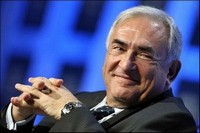IMF to Stimulate Emerging Economies

IMF to Stimulate Emerging Economies
- At the IMF's annual meeting Dominique Strauss-Kahn, International Monetary Fund Managing Director, campaign s for turning the fund into a kind of global central bank with at least $1 trillion for lending developing nations in a crisis.
But a very different reality is taking shape: The IMF is essentially being turned into the staff of the Group of 20, an organization of industrialized and developing nations that doesn't have a headquarters, staff or rules for membership. With the leaders of the G-20 effectively functioning as the board of directors of the global economy, they need the IMF's help to carry out their role.
While the IMF's new assignment was discussed at the G-20 leaders' summit in Pittsburgh recently, it was more fully fleshed out -- and widely endorsed by non-G-20 countries -- in Istanbul over the weekend. It was also backed by finance ministers from some of the world's largest industrialized countries and won a nod from an IMF policy committee that convenes at the annual meeting. And while Mr. Strauss-Kahn would like the IMF to do more, he too has embraced the emerging G-20 role, The Wall Street Journal reports.- In the meantime, w ise decisions and firm actions are all the more crucial now as a reversal can deal a severer blow to the still healing economy and, more importantly, confidence.
The world economy is predicted to return to a growth of 3.1 percent next year after an estimated 1.1 percent contraction this year as recession is ending, said the IMF in a report released ahead of the meetings.- The projection for 2009 was an upward revision of 0.6 percent from the IMF's April forecast, reflecting the changes the world economy went through in the past year.
- Sweeping credit meltdown and plummeting world trade had brought the world economy to the brink of collapse and pushed 90 million people into poverty before signs of mending emerged in the second quarter.
- In an unprecedentedly strong will to collaborate, governments rolled out massive stimulus projects, poured trillions of U.S. dollars into beleaguered banks and reduced interest rates to historic lows or even near zero levels.
- The efforts paid off. Industrial output drops slowed in recent months, as consumption lifted on government subsidies and emerging economies like China and India showed resilience against the recession, Xinhua reports.
- Globe and Mail quoted the IMF's 25-member International Monetary and Financial Committee as saying, "We will remain vigilant to prevent financial sector excesses and the re-accumulation of unsustainable global imbalances."
- To bolster the commitment of emerging economic powers such as China to international co-operation, the IMFC said 5 per cent of the IMF's voting shares would be shifted to China and other underrepresented countries from industrialized nations whose relative weight in the global economy has diminished, Globe and Mail reports.
Subscribe to Pravda.Ru Telegram channel, Facebook, RSS!
Popular
Last materials


